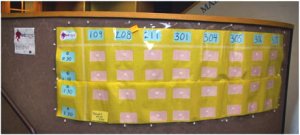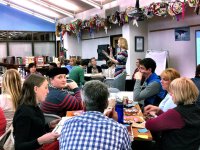Why Edcamp?
Edcamps are informal sessions by and for teachers, where anyone can present, and the focus is on collaboration and connections, group expertise, tech tools, and instructional design.
Your content has been saved!
Go to My Saved Content.During the past six years, hundreds of Edcamp events have popped up worldwide. Teachers from every corner of the globe have been organizing open opportunities for educators to collaborate and solve problems.
In spite of this growth and energy, there are still many educators who are either uninformed or skeptical of the Edcamp model for teacher professional development. Given the plethora of "silver bullets" and magical cures in education, some skepticism is healthy. It ensures that we refine and revise our beliefs through meaningful investigation.
What's an Edcamp?
Let’s begin with a definition. In short, Edcamps are:
- Free: Edcamps should be free to all attendees. This helps ensure that all different types of teachers and educational stakeholders can attend.
- Non-commercial and with a vendor-free presence: Edcamps should be about learning, not selling. Educators should feel free to express their ideas without being swayed or influenced by sales pitches for educational books or technology.
- Hosted by any organization or individual: Anyone should be able to host an Edcamp. School districts, educational stakeholders and teams of teachers can host Edcamps.
- Made up of sessions that are determined on the day of the event: Edcamps should not have pre-scheduled presentations. During the morning of the event, the schedule should be created in conjunction with everyone there. Sessions will be spontaneous, interactive and responsive to participants' needs.
- Events where anyone who attends can be a presenter: Anyone who attends an Edcamp should be eligible to present. All teachers and educational stakeholders are professionals worthy of sharing their expertise in a collaborative setting.
- Reliant on the "law of two feet" which encourages participants to find a session that meets their needs: As anyone can host a session, it is critical that participants are encouraged to actively self-select the best content and sessions. Edcampers should leave sessions that do not meet their needs. This provides a uniquely effective way of "weeding out" sessions that are not based on appropriate research or not delivered in an engaging format.
Despite the concrete definition, it can be difficult to truly capture the Edcamp experience. That's because a "typical" day of learning at an Edcamp doesn't really exist. Each Edcamp is unique and based on the needs of the participants. When you arrive at the location (usually a school or university) on the day of the event, there is no pre-set schedule of sessions or presenters. Instead, there's just a blank sheet of big paper with a grid on it.

From that blank slate, everyone builds the session schedule together. As people mingle and chat over free coffee and donuts, they put up potential discussion topics on a board. Since it's my job to build the schedule at the Edcamp events I organize, I can truly attest that the entire process is positive and organic. Occasionally, people who don't even know each other realize that they have similar interests and end up running a session together. Other folks come with an idea, throw it out to the group, revise it, and end up posting it with a refined focus. Since anyone who attends an Edcamp event can be a presenter at the event, it's a very empowering experience for everyone involved.
The skeptics are likely wondering, "What do you do if no ones signs up?" (I get that question a lot.) And while there are certainly specific strategies you can use to ease your anxiety (building an idea board on the event page, having conversations with amazing educators who are planning to attend, etc.), they usually aren't needed. I've never attended or heard of an Edcamp where the schedule board didn't fill. It just doesn't happen.
What Happens in a Session?
Given the spontaneity of the schedule creation, you may be curious about the content of the sessions that are typically shared at an Edcamp. Well, it's certainly hard to generalize, but here is a sampling of sessions from recent Edcamp events:
- Edcamp SF Bay
- Fostering Student Learning Networks
- How to Run Your School from Your iPhone
- The Global Read Aloud and Reading in the 21st Century
- Badges, Levels, Games, and Learning
- Twitter Newbies
- Collaborative Classrooms, a New Physical Environment
Educators often have very specific, concrete takeaways from sessions like these all over the country. Consider these positive personal outcomes:
- "I learned ways to flip my faculty meeting, spending less time on announcements and more time on PD, relationship building and modeling a maximization of time with my staff." - Joe Mazza
- "I absolutely loved hearing about Lauren's experience with a school-wide topic of study, and would love to bring this practice to our school. She described a school whose study topic was 'India,' and every grade level, across all content areas, sought to plan experiences that helped students engage with that topic in some way." - Lyn Hilt
- "In one Edcamp I learned about all the cool things you can do with Evernote and how you can save everything there!" - Joy Kirr
These aren't merely fluffy concepts. They are specific, practical strategies and ideas that educators are sharing and investigating at Edcamps all over the nation.
Beyond the Takeaway
Further, the social, interactive, recursive nature of an Edcamp is directly aligned to adult learning theories. In a whitepaper I wrote in 2011, blog posts about Edcamp were qualitatively analyzed to determine common themes. The most popular ideas were:
- Collaboration and connections
- Group expertise
- Tech tools
- Instructional design
- Surprise (at the number of educators dedicated to their craft)
These themes are directly correlated to the tenets of effective adult learning as stated in the meta-analysis by National Academies Press entitled How People Learn: Brain, Mind Experience, and School. And further peer-reviewed research in 2016 has corroborated these findings and added greater understanding about the efficacy of the model.
The Edcamp model provides educators with a sustainable model for learning, growing, connecting, and sharing. Everyone's expertise is honored, and specific, concrete strategies are exchanged. When professional development is created "for teachers by teachers," everyone wins.
